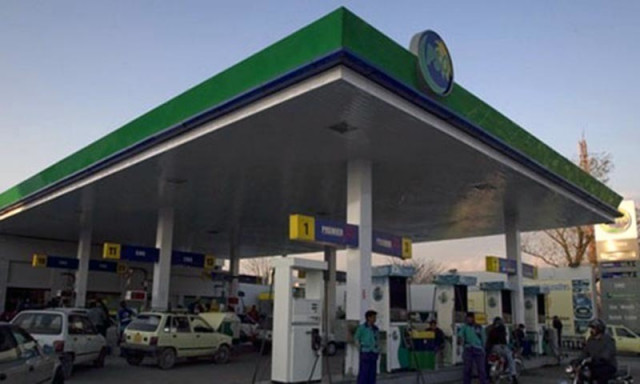Defence ministry stops PSO from building new oil storages
Asks petroleum ministry to get the go-ahead from National Security Council

PHOTO: REUTERS
Pakistan State Oil (PSO), the state-owned oil marketing giant, is seeking to set up additional storages to keep adequate fuel reserves and ensure a smooth supply to different consumers.
It also wants to lay a pipeline connecting Karachi Port and Port Bin Qasim in a bid to avoid any interruption in the supply of petroleum products.
PSO seeks to build storages, connect ports via pipeline
After winning required permission from the Explosives Department and the Oil and Gas Regulatory Authority, the proposal for building new storages with a capacity of 34,100 tons had been sent to the Ministry of Defence for obtaining its no-objection certificate, in light of a ban on new oil tanks at the Keamari oil installation area.
However, the Ministry of Defence declined to entertain the request and asked the petroleum ministry to seek exemption from the National Security Council or the national cabinet.
The previous government of Pakistan Peoples Party (PPP) had decided to shift all oil installations from Keamari and Karachi Port to the Khalifa Point at Hub, Balochistan because of security concerns. It also imposed a ban on setting up new oil storages at Keamari due to the security threat.
A PSO official told The Express Tribune that they had prepared a plan for building additional oil tanks as well as a pipeline to connect the two ports in Karachi and sought approval of the federal government.
He stressed that the economy and energy security of Pakistan depended heavily on regular and sustainable supplies of imported fuels. At present, the demand for petroleum products stands at over 23 million tons per annum and it is expected to rise to 27 million tons in 2020.
Of the total demand, 10 million tons, or 44%, are produced by domestic refineries and 13 million tons (56%) are brought through imports.
Similarly, more than two-thirds of the crude processed by domestic refineries is imported. In financial year 2015, of the total crude processed by the refineries, around 3.9 million tons (32%) were produced in the country whereas 8.2 million tons (68%) were bought from international markets.
PSO meets energy needs of consumers through a widespread network of depots across the country with a storage capacity of around one million tons, which is around two-thirds of the total storage capacity of oil marketing companies.
Hascol to build oil storage facility at Port Qasim
PSO imports 10 million tons (over 75%) out of total imports of 13.2 million tons into the country.
Premier motor gasoline (petrol) demand over the past several years has shown an unprecedented growth, going up 5 times from 1.15 million tons in financial year 2007 to 5.8 million tons in financial year 2016.

Owing to storage constraints at Keamari, it has become extremely difficult for PSO to smoothly meet the demand and swiftly offload petrol from vessels carrying 50,000 tons or more because of current storage capacity of only 40,000 tons at Keamari.
Moreover, jetty constraints at Port Qasim make it impossible to ship petrol from Keamari to Port Qasim. Consequently, the supply chain faces the risk of delay and port congestion.
In order to address the difficulties, which also caused the petrol crisis in January 2015, the petroleum ministry asked PSO to increase the petrol storage capacity by 150,000 tons - 100,000 tons in Karachi and 50,000 tons in upcountry areas.
Thereafter, PSO initiated efforts and submitted a plan in July 2015 for enhancing the storage capacity to about 125,000 tons including 106,000 tons in Karachi and 19,300 tons at upcountry locations.
Published in The Express Tribune, November 2nd, 2016.
Like Business on Facebook, follow @TribuneBiz on Twitter to stay informed and join in the conversation.



















COMMENTS
Comments are moderated and generally will be posted if they are on-topic and not abusive.
For more information, please see our Comments FAQ